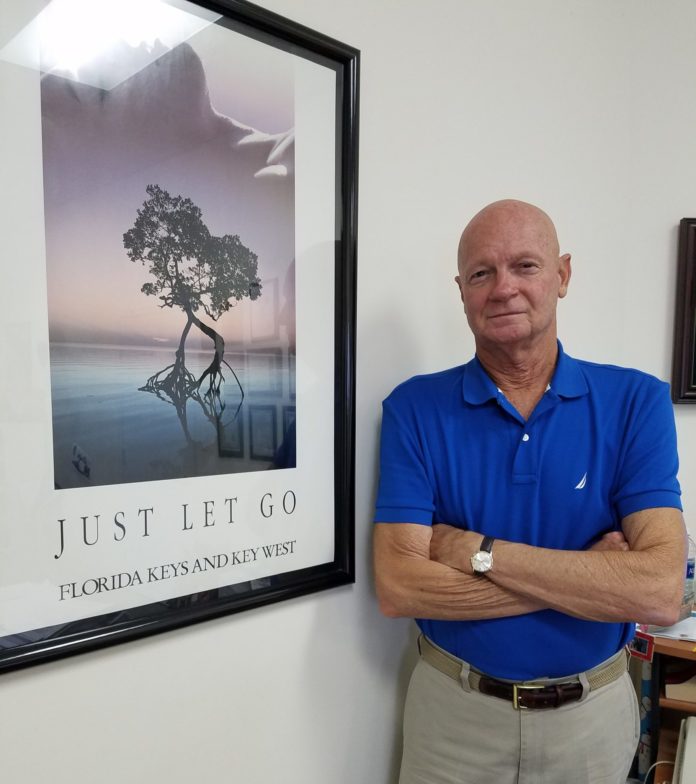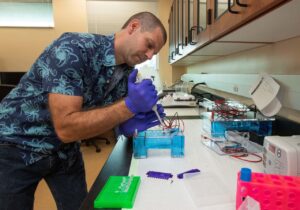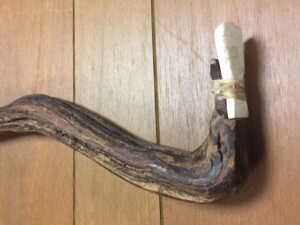Head of TDC steps down after 20 years
Harold Wheeler knew it was time to retire, but he will be the first to admit it wasn’t an easy decision. At 70, the seasoned marketing director commands an annual budget of more than $55 million, while framing the blueprint of the Florida Keys tourism boom after taking the helm of Monroe County’s Tourism Development Council in April 1996.
And while he is adamant that recent measures by county commissioners, which limited the TDC’s marketing dollars, were not the catalyst for his planned September exit, it is evident that Wheeler is concerned about the Florida Keys shifting away from a tourism climate he authored.
In his White Street office, a tourism poster hangs above Wheeler’s desk that reads, “Just Let Go.” Yet to his right, another photo depicts the great Muhammad Ali in a bout with South American Oscar Bonavena (Wheeler is an avid boxing fan). And to some extent, this has been the ironic tug-of-war of Wheeler’s existence for the past two years. To let go, and spend time at his North Carolina cabin and watch his son, Clayton, grow up. Or to continue fighting for a fitting end to a legacy.
Recently, Wheeler, who is typically reserved and fashionably humble, granted a rare interview to the Keys Weekly, explaining why it was time to hang up his gloves and retire on top.
Why retire now? It’s a tough choice. A real tough choice. It took me two years to decide. I just turned 70 in April. I hate to say it, but that had something to do with it. But I would say the biggest reason is to spend more time with my son.
You are humble almost to a fault. Can you accept being the author of Florida Keys tourism as we know it today? No, my dad taught me a long time ago there’s nothing you can’t accomplish when you give others the credit. And what I mean by that, is they (TDC staff, DAC boards, Tinsley Advertising, Newman PR and Two Oceans Digital) deserve the credit. You just can’t take all the credit when you have a team like this doing great work.
Yes, but a lot has changed since you took over in 1996. What was it like when you first walked into this office? By 1997 we were working on and approving the first comprehensive marketing plan. Before, there were just pieces of paper with tradeshows, PR and advertising notes for media placement. It wasn’t organized and barely a dozen pages. Today, it’s hundreds of pages and recognized in our industry. I’m very proud of that.
So what do you think your legacy will be at the TDC? I really don’t know what my legacy will be. I know when I came in we had a budget right at $10 million and our budget for 2018 is going to be about $58 million. Much of that changed when we were able to approve the fourth promotional penny tax in 2009, which boosted our revenue by 25 percent. It’s quite something really.
But recent measures by the Monroe County Board of County Commissioners have seemingly reduced advertising dollars. Do you ever feel like you are being punished for doing your job well? As for current issues and some of the negative things that have been coming up lately with cutting advertising dollars, you know, we’ve been working on that and dealing with those issues for a long time. You go through those dips every once in a while. And I understand it. But I’m disappointed. We are going to follow whatever the board of county commissioners sets as policy because they are the governing body.
So what was all the fuss about? The board didn’t like this last issue of going to more capital just for the single point of doing less advertising. And that’s what it’s about. It was the cities and municipalities saying they wanted equality with the county – to get 100 percent on capital projects. And you know, it sounded like a civil rights action. “We want equality and the same as the county.” But that wasn’t it. It was a money grab by the municipalities. Period. End of sentence.
So why did the county go along with it? Because the BOCC wanted to reduce the advertising. And so a good way to do it is to just give the municipalities more money that will take away from advertising. Fine. If that’s what the county wants, then that’s fine. We’re going to do, obviously, whatever they change the policy to.
In your view, what are the repercussions to less advertising of the Keys? There’s no county in the state of Florida where the visitors are paying 60 percent of the taxes. Sales taxes, infrastructure tax, ½ cent school tax — and the tourist impact tax is paid 100 percent by the tourists. And so when you want less advertising, and they are clear about it because they want less visitors, you’re going to get less spending. When you get less spending you get less taxes. Now you’re going to have a county government three or four years from now, and it won’t be overnight, that currently has a very strong contingency fund saying “Where did the money go?”
And the answer will be? Either they are going to raise taxes on the residents or they are going to cut services. That’s your two choices. So if you’re going to give in to complaints on the situation, then you better understand there’s going to be repercussions down the road.
But what about the people who say the Keys are too congested and the TDC is to blame? No. It’s developers. It does get blamed on the tourist development council to some degree. But there’s one road in and one road out and there’s a lot of construction. We’ve had a lot of, probably a half dozen, large lodging properties developed in the last five years that have been permitted by the county. And yet, what are we supposed to do? Not market these hotels? If you want to cut back on the number of visitors coming to the Keys — yes, we can cut back on advertising. But stop building hotels and resorts! It doesn’t make sense.
But what about the county’s plan to police the illegal units in Monroe County? Well if you’re concerned about more visitors here, don’t bring them into compliance. Shut them down. And maybe convince them that long-term rentals is the way to go. And now you have so many illegal units throughout the keys. Do we need the bed tax (from the illegal units)? I’m not sure we do. But if the county thinks we do, then stop complaining about how many visitors are here and telling the TDC they can’t advertise properties.
Okay, let’s lighten it up. Is there a current county commissioner you would take into a foxhole? And why? Wow. (Long pause and smile). There’s some I might push out of the foxhole [laughing]. No, I would probably keep, with this group, Commissioner Sylvia Murphy. She’s wise and what she tells you is what she sticks to. And she’s up front about it.
What advice do you have for the person who steps into your role? It needs to be someone with good personal and political judgment. I’m not a politics person, but you’re surrounded by it. And I think you’re going to see more and more of it now. And I think it’s something the industry itself needs to be more involved with.
So you don’t think policy makers are going ease up on the TDC? We’ve been very successful. But when you’re successful the (tourism) industry keeps an eye on you. I think the industry feels very comfortable with what the TDC does, but I think they are getting ready to see a change with the politics of it all. And I keep reminding people that the BOCC is our governing body, but they’re going to make some changes, because visitors don’t vote. Residents vote. And the BOCC’s reaction is probably not going to be very helpful to the industry. And I wish the governing body would be a little more protective of this industry.
You continue to refer to tourism as an industry. Why? It’s the only industry we have. Tell me what other industry we have here? And if someone says commercial fishing, fine. But that’s going on the downside at this point and time. So yes, it can be a pain. There are always negative impacts to any industry. But at least we are not getting smoke up in the air and getting the water dirty and everything else with the environment. (Tourism) is a clean industry and it’s a good industry.
What will you miss the most? My staff for sure. The agencies and the boards. We just have a good rapport all the way around. I live two blocks a way. I walk to work. Wear khaki pants and a pull over shirt. It’s a relaxed atmosphere for sure. But I think all of the staff know it’s really important work we do here and it affects a lot of people.



























